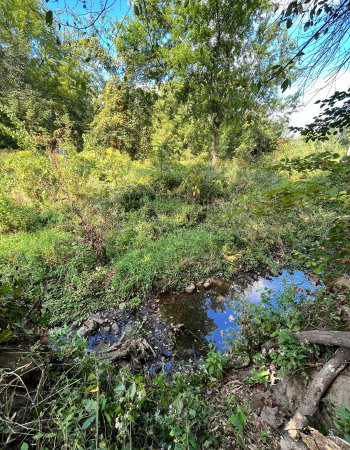Looking for fecal contamination through microbial source tracking in Scott County
posted
by Guest Blogger on Thursday, February 29, 2024
In 2023, Partners of Scott County Watershed (PSCW) was asked to be a partner in the Movement Infrastructure for Clean Water in Iowa grant funded by the Water Foundation. The goal for this grant is to build relationships among environmental groups that have taken on responsibility for water monitoring, develop shared tools for interpreting the data, and communicate to the public how monitoring can lead to action. The partners within this grant are PSCW, Prairie Rivers of Iowa, Northeast Iowa RC&D, Pathfinders RC&D, Iowa Environmental Council, Izaak Walton League, Polk County Conservation, and Drake University.

PSCW's role within this grant was to conduct water monitoring at 14 different locations within the Duck Creek and Hickory Creek Watersheds. This was done by grabbing 14 - 32 oz water samples of stream water while also recording the weather, salinity, pH, total suspended solids, turbidity, and water temperature for each site. The stream sample sites were selected to represent urban and rural data. The samples are currently being analyzed by the
USGS - Laboratory for Infectious Disease and the Environment (LIDE).The tests being conducted are part of a process called microbial source tracking (MST), which is a term used to describe the process of identifying the source of fecal contamination. Fecal contamination in the streams could be from nearby animals or humans who reside in or around the watershed, runoff, dumping, or many other sources. We utilize MST to help predict a potential source of fecal pollution to then help pursue a solution to minimize health risks within the watershed.
In PSCW’s specific MST investigation, we had the lab run fecal qPCR analyses, a laboratory method used to measure a targeted DNA molecule. The tests look for bacteria and viruses, including: Bacteroidales-like Cow M2, Ruminant Bacteroides, Pig-1-Bacteroidales, Avian associated Bacteroidales (GFD), Goose Bacteroidales, Poultry parvovirus, Canine Bacteroides, and Human Bacteroides (HF183/R287). These parameters will give us a strong indication if humans, ruminants (including cattle, sheep, and deer), swine, poultry, geese, and/or canines are sources of fecal pollution within the two watersheds.
.png)
Microbial Source Tracking - An Overview. ScienceDirect, 2022.
The samples taken for these tests were grabbed in the morning from August to October in three separate rounds. The first round of samples were collected during lower stream flow rates, the second grab was during an average flow rate, and the third sample was grabbed during the typical fall manure application period. These parameters were selected to best showcase any fecal concentrations during specific flow stages and identify if any excess fecal concentration rates were present due to manure application. An investigation objective was to collect samples during a high stream flow rate, but due to Eastern Iowa drought conditions, we were unable to.
Our end goal is to summarize the findings of the investigation, determine any conclusions and possible remedial activities, and provide a report on how other water quality groups can duplicate such efforts to investigate fecal pollution in their watersheds. PSCW plans to collect more data on watersheds in Scott County to adequately determine fecal contamination sources and hopefully address those sources with restoration and remedial projects.
About the Author
.png)
Liv Humphrey is the Watershed Coordinator for Partners of Scott County Watersheds, joining in August of 2023.
In 2022, she received her bachelor's of science in Environmental Science at San Diego State University, where she found her passion with working with community members on conservation efforts.
- clean water
- water quality